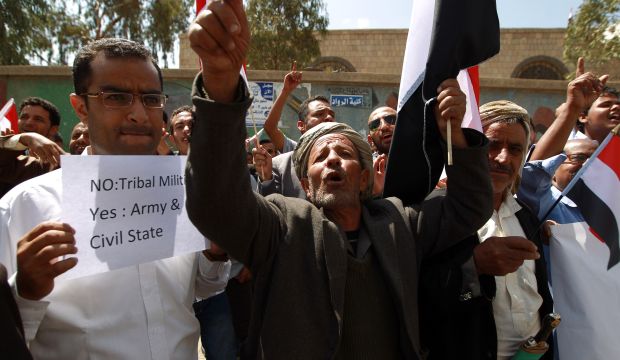
Yemeni protesters chant slogans against Houthi rebels during a rally on September 30, 2014 in the capital Sana’a. (AFP Photo/Mohammed Huawis)
Sana’a, Asharq Al-Awsat—The Houthi movement continued to consolidate its hold over Sana’a on Monday, seizing more state institutions and buildings amid an almost total absence of the Yemeni military on the capital’s streets.
According to several reports, Houthi rebels, who have been in virtual control of Sana’a since September 21, sent “tens of fighters” to surround a number of buildings including the country’s central bank, the state oil company and the headquarters of the country’s oil ministry, as well as several other state-owned companies operating in the petroleum sector, which accounts for more than 70 percent of state revenues.
The group also announced on Monday it would be establishing a committee to receive and deal with complaints or accusations regarding any “transgressions” committed by the group’s members toward ordinary citizens, in a move many observers described as an attempt to assume the role of the country’s law enforcement institutions amid the current security vacuum in the country.
Meanwhile, the ruling General People’s Congress (GPC), which was founded by former president Ali Abdullah Saleh and whose members include current President Abd Rabbuh Mansur Hadi, denied on Monday it had any involvement in the Houthi takeover of the capital.
Several media outlets, including Asharq Al-Awsat, have recently quoted sources who allege that GPC political and military figures who are also former members of the Saleh regime had been complicit with the Shi’ite group in its takeover of the capital, accusing them of helping Houthis take over government buildings and weapons stored in security installations as well as leading them to the private homes of a number of current military and security figures.
A local private news agency owned by Saleh carried comments by the GPC’s official spokesman, Abduh Al-Guindy, saying the accusations were false.
He said: “The continued spreading and fabrication of such false reports and information aims to insult the GPC, its leadership and its patriotic stance toward the current events, a stance that has been made public many, many times.”
He referred to reports of secret alliances and arms deals between Saleh, who still heads the party, and Houthi leader Abdul Malik Al-Houthi, and reports the group had been giving weapons to Saleh loyalists in the capital as “lies which have no basis in reality.”
Guindy also threatened to sue Asharq Al-Awsat for what he deemed to be “slander” against the party’s leadership, in reference to the newspaper quoting a source saying that Saleh loyalists from the country’s military had secretly helped the Houthis take control of a number of state institutions.
He said such reports “aimed to involve the GPC and its leadership in a conflict it has nothing to do with.”
Meanwhile, the Ministry of Defense held funerals for five members of the security forces killed during clashes last week that began when Houthis rebels attempted to take over the country’s state television building.
In a statement, the Ministry said the five “martyrs were killed while doing their national duty” trying to protect the building from the Houthi onslaught.
Orders were eventually given out by the Ministry for its forces to vacate the building and hand it over to the Houthis, whom it said were “friends” in the statement it issued to state employees and security forces during the fighting.
The current turmoil in Yemen began with a month-long series of protests staged last month by the Houthis, demanding the appointment of a new government and the reinstatement of fuel subsidies. The protests culminated in fierce clashes between armed members of the group and the security forces, who eventually withdrew from the capital, leaving the Houthis to seize control of large areas of the city.

Trackbacks/Pingbacks